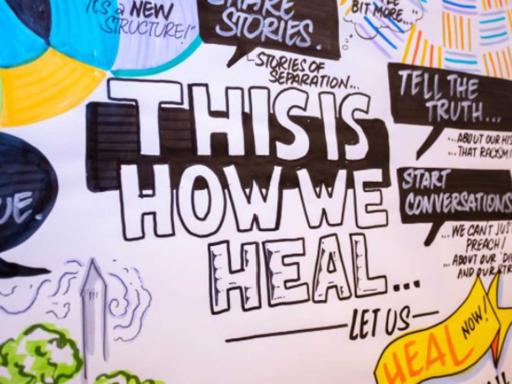Five Years of Truth, Racial Healing & Transformation: Continuing the Journey
We’re kicking off a series of features highlighting the work from Truth, Racial Healing & Transformation (TRHT) Michigan sites’ fifth and final grant year.
We’re kicking off a series of features highlighting the work from Truth, Racial Healing & Transformation (TRHT) Michigan sites’ fifth and final grant year.

As the Truth, Racial Healing & Transformation (TRHT) Michigan sites completed the fifth and final grant year, we’re getting an inside look at the processes and implementations of each Michigan TRHT site, lessons learned, how they supported communities, built relationships and how this work will continue. This week we are featuring TRHT Kalamazoo.
CMF is the statewide convener supporting the four Michigan sites in Battle Creek, Flint, Lansing and Kalamazoo. The initiative is led by The W.K. Kellogg Foundation.
The fifth-year evaluation report highlights activities and outcomes of the past year as well as reflections on the experience of the past five years.
Over the last five years, the Kalamazoo site, hosted by the Kalamazoo Community Foundation (KZCF) since 2017, has worked to address structural racism and inequality in housing, criminal justice, law enforcement, education and more.
As CMF reported, the Kalamazoo site’s Law Design Team works to build bridges between community and law enforcement through racial healing. The team has led projects to enhance the bonds of trust between law enforcement and the communities they serve by addressing the divisions that exist now.
Kalamazoo’s Housing Task Force partnered with local organizations to help pass the Housing Equity ordinance by the Kalamazoo City Commission.
The ordinance sought to expand housing protections, create a Civil Rights Board, protect against predatory application feeds, protect against blanket rejections and remove religious exemptions for public accommodation-type housing.
The site’s work has expanded beyond Kalamazoo through collaborations including:
According to the TRHT Kalamazoo co-directors, Emily Olivares and Frances Vicioso, KZCF believes the civic health of Kalamazoo is critical to its success.
“All citizens in our community should be enabled and empowered to participate in public discourse and decision-making. Attacks or attempts to limit the civil rights of individuals in our community must be prevented, especially for community members who have been historically excluded,” the co-directors said.
In its final grant year, Kalamazoo saw the departure of its director, Sholonna Lewis, and introduced a new position within the community foundation.
Rather than appoint another single director, the TRHT leadership adopted a shared leadership model, which was informed by a six-month strategic planning and racial healing process and chose program managers Olivares and Vicioso as co-directors. The site also hired KZCF’s first contract capacity coordinator.
“This has given us the flexibility to guide the work of TRHT in a way that feels like we can work with more ease and less burnout. We have a learning mindset around shared leadership, are leaning hard into discomfort around breaking hierarchical structures and hold gratitude for the opportunity to reimagine leadership in this way,” Olivares said.
During this process, the site also decided that the TRHT initiative would continue to be housed at KZCF.
As CMF reported, after its fourth year of implementation, the Kalamazoo site had future plans to add an additional full-time staff position and continue to study whether TRHT work should continue to be housed at the community foundation or become its own entity.
According to the report, the shared leadership model has functioned smoothly during the year since it was adopted. Through this process, the TRHT focus on deep relationship building has become more deeply integrated into KZCF’s philosophy and operations.
According to Olivares and Vicioso, they have taken the framework of TRHT and applied it to KZCF’s Initiatives and Public Policy area.
“The role TRHT has played in transforming our own organization from the inside out will have a lasting impact. We believe everyone in the organization must be engaged in this work,” Vicioso said.
According to the report, the site is finding success in supporting affinity groups that connect directly with target populations.
TRHT Kalamazoo created an educator of color affinity group that supports Black, Indigenous and People of Color (BIPOC) school students countywide, with plans to launch a “parent university” for parent engagement with youth and multigenerational learning. Kalamazoo would be the fifth parent university in the state, with plans to launch this summer.
The site continues to engage with powerful organizations in the community, build relationships and address tensions that long predate TRHT.
TRHT Kalamazoo shared that this is an incremental process of finding people within historically inequitable institutions willing to listen, do the work and move their organizations toward equity. It also requires holding institutions accountable for inequitable policies or practices while seeking dialogue and offering support to help resolve them.
“We can't influence systemic transformation without deep relationships,” the co-directors said.
While the five-year grant implementation of TRHT has ended, all sites will continue this work in various ways. TRHT Kalamazoo will plan to carry on the work with relatively few changes and continue to collaborate with other TRHT sites and community partners.
Want more?
Learn more about TRHT Kalamazoo.
Learn more about TRHT.
Read TRHT Kalamazoo’s 2017-2020 Impact Report.
Read TRHT Kalamazoo’s 2017-2020 Impact Report.